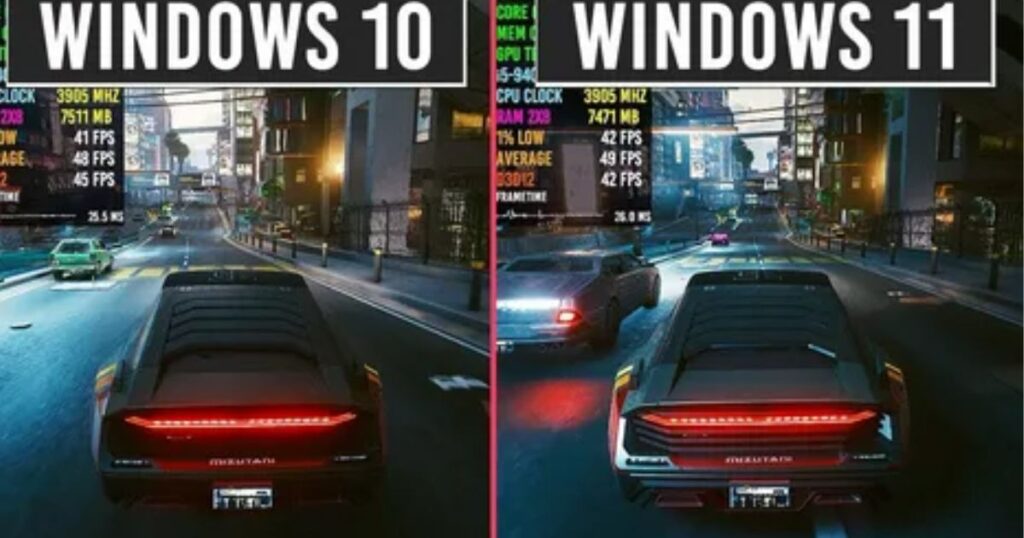When it comes to PCs, the operating system you choose has a significant impact on how much enjoyment you get from gaming. For years, Windows 10 has been the trusted choice for gamers, offering stability, familiarity, and compatibility with nearly every title. But with Windows 11 steadily evolving since its 2021 release, many gamers are wondering: Is it finally time to upgrade, or should you stick with Windows 10 in 2025?Microsoft has packed Windows 11 with gamer-focused features, including DirectStorage for faster load times, Auto HDR for richer visuals, and enhanced Game Mode optimizations. On the other hand, Windows 10 still holds the advantage of unmatched compatibility and a proven track record for stability. With Windows 10’s official end-of-support looming in October 2025, the debate has become more relevant than ever for anyone serious about gaming.In this post, we’ll break down Windows 10 vs. Windows 11 for gaming in 2025, comparing performance, exclusive features, stability, and future-proofing—so you can decide which OS best fits your gaming needs.
A Brief Overview of windows 11 vs windows 10 gaming
Windows 10: The Familiar Champion
Released in 2015, Windows 10 has been a cornerstone for PC gamers. It introduced features such as DirectX 12, which optimized CPU and GPU usage for improved graphics and performance, as well as Game Mode, which prioritizes system resources for gaming. Its maturity, compatibility with a wide range of hardware, and extensive game library have made it a go-to choice for gamers. However, with Microsoft’s support ending soon,
Windows 10 users face a critical juncture.
Windows 11: The Modern ContenderLaunched in is windows 11 faster 2024, Windows 11 introduces a sleek redesign and gaming-focused features, including DirectStorage and Auto HDR. It’s optimized for modern hardware, particularly hybrid CPUs, and promises faster load times and enhanced visuals. However, Krnl Key | Krnlkey Online | Krnl Key Bypass its stricter hardware requirements and early teething issues have sparked debate among gamers about whether it truly outshines its predecessor.Let’s break down the comparison across key areas: performance, gaming-specific features, compatibility, security, and future-proofing.
Performance: FPS, Load Times, and System Efficiency

Benchmarking Head-to-Head
When it comes to raw gaming performance, benchmarks tell a nuanced story. Independent tests conducted by tech publications such as TechSpot and EaseUS have shown that, in most games, the performance difference between Windows 10 and Windows 11 is minimal. For popular titles like Cyberpunk 2077, Call of Duty: Warzone, and Forza Horizon 5, average FPS (frames per second), 1% lows, and 0.1% lows are often within a 5% margin of error. For example, in Shadow of the Tomb Raider, Windows 11 might edge out Windows 10 by 2-3 FPS on high-end systems. Still, in some cases, Windows 10 performs slightly better, particularly on older hardware.
However, Windows 11 shows slight advantages in specific scenarios. Its improved memory management and task scheduling, especially for Intel’s 12th, 13th, and 14th-generation hybrid CPUs (with Performance and Efficiency cores), can result in smoother frame rates and fewer stutters in CPU-intensive games. This is due to Windows 11’s Thread Director, which optimizes core allocation—a feature that Windows 10 lacks. For AMD Ryzen users, the difference is less pronounced, as Windows 10 handles these CPUs well.
Load Times and DirectStorage
One of Windows 11’s standout features is DirectStorage, a technology borrowed from Xbox that enables games to bypass the CPU by loading data straight from an NVMe SSD to the GPU. This can significantly enhance performance and accelerate load times. In appropriate games. In compatible games, such as Forspoken and Ratchet & Clank: Rift Apart. While DirectStorage is technically available on Windows 10, it’s better optimized on Windows 11, and developers are increasingly targeting the newer OS. For gamers with high-end NVMe SSDs, Windows 11 can shave seconds off load times, making it a noticeable upgrade.
System Resource Usage
Windows 11 is often criticized for being more resource-intensive than Windows 10. Posts on X and Reddit threads note that Windows 11 can use more RAM, VRAM, and CPU power, sometimes without delivering proportionally better performance. For low- to mid-range PCs, Windows 10’s lighter footprint makes it easier to optimize for gaming, especially when debloated using tools like Ultimate Tweaks. A properly tweaked Windows 10 system can have process counts in the low 50s, reducing background load and boosting FPS. Windows 11, even when optimized, tends to run more background processes, which can result in minor stutters on less powerful systems.
Verdict on Performance
For high-end PCs equipped with NVMe SSDs and modern CPUs, Windows 11 provides slight performance advantages, particularly in terms of load times and CPU scheduling. However, for mid-range or older systems, Windows 10 remains competitive, often delivering comparable FPS with lower resource demands. If your rig isn’t a “monster build,”windows 11 vs 10 for gaming might still be the smoother choice.
Gaming-Specific Features
Windows 10: Tried and Tested
Windows 10’s gaming features are robust and familiar. Its Game Mode reduces background activity to prioritize gaming performance, and DirectX 12 support ensures compatibility with modern game engines. The Xbox app integrates well with Game Pass, although some users report occasional issues, such as corrupt game files.The Game Bar in Windows 10 provides effortless screenshot capture, gameplay recording, and performance monitoring, serving as a reliable tool for both casual and competitive gamers.
Windows 11: Next-Gen Enhancements
Windows 11 builds on Windows 10’s foundation with features tailored for modern gaming:
- DirectStorage: As mentioned, this reduces load times and improves performance in supported games, but requires an NVMe SSD and a compatible GPU.
- Auto HDR: This automatically enhances older games with high dynamic range lighting, adding vibrancy and contrast on HDR-capable monitors. It’s a subtle but visually pleasing upgrade.
- Enhanced Game Bar: windows 11 or 10 for gaming Bar is more intuitive, with improved integration for Xbox Game Pass and quicker access to performance metrics.
- Dynamic Refresh Rate: Introduced in 2023, this feature optimizes multi-monitor setups by reducing issues for gamers with mixed refresh rate displays.
- Automatic Super Resolution: Similar to Nvidia’s DLSS or AMD’s FSR, this technology upscales games for improved visuals without sacrificing performance, although it’s limited to specific titles.
These features make Windows 11 feel like a forward-looking platform, especially for gamers with cutting-edge hardware. However, many of these enhancements require specific setups (e.g., HDR monitors or NVMe SSDs), Best Nintendo Switch Games limiting their immediate impact for some users.
Verdict on Features
Windows 11’s gaming features are more advanced, particularly for next-gen titles and high-end hardware. Windows 10’s features are still practical, but they lack the modern polish and optimizations of Windows 11. If you’re excited about technologies like DirectStorage and Auto HDR, Windows 11 is windows 11 better than windows 10 for gaming the better choice, provided your hardware supports them.
Compatibility: Hardware and Software
Hardware Requirements
Windows 11’s stricter hardware requirements are a significant hurdle. It mandates TPM 2.0, Secure Boot, and a compatible CPU (generally Intel 8th-gen or newer, or AMD Ryzen 2000 or newer). Many older but capable PCs can’t officially run Windows 11, forcing gamers with aging rigs to stick with Windows 10 or upgrade their hardware. Windows 10, by contrast, supports a broader range of hardware, making it ideal for budget or older systems.
Software and Game Compatibility
Windows 10’s maturity means it has fewer compatibility issues with older games and software. Some Reddit users report that Windows 11 can struggle with legacy titles or peripherals due to driver incompatibilities, although these issues have been alleviated with updates. Windows 11’s compatibility with modern games is excellent, and its integration with Xbox Game Pass is smoother than Windows 10’s, with fewer reported bugs.
Driver Support
Graphics driver support is a critical factor. Nvidia and AMD are expected to phase out Game Ready drivers for Windows 10 shortly after its end-of-support date, following the precedent set with Windows 7. This means Windows 10 users may miss out on optimizations for new games and GPUs. Windows 11, A Player’s Guide To Sakura Stand Private Server Excellence being Microsoft’s focus, will continue receiving driver updates, ensuring better long-term compatibility with future hardware.
Verdict on Compatibility
Windows 10 wins for compatibility with older hardware and software, making it the safer choice for legacy systems or games. Windows 11, however, is better suited for modern setups and will have more substantial support for new games and hardware moving forward.
Security: A Growing Concern for Gamers
Windows 10: Aging Security
With Windows 10’s support ending in October 2025, security updates will cease unless users opt for the Extended Security Updates (ESU) program, which costs $30 per year. Without updates, Windows 10 systems will remain vulnerable to new exploits, posing a significant risk to gamers with valuable accounts on platforms like Steam or Battle.net. Additionally, modern anti-cheat systems in games like Valorant and Call of Duty: Warzone may not function optimally on Windows 10 post-2025, potentially leading to cheat-infested lobbies.
Windows 11: Modern Protection
Windows 11 enforces TPM 2.0 and Secure Boot, providing robust protection against malware and account hijacking. Its kernel-level security features support advanced anti-cheat systems, ensuring a fairer gaming experience. Features like Smart App Control and virtualization-based security add layers of protection, making Windows 11 a safer choice for online gaming.
Verdict on Security
Windows 11’s modern security features make it the clear winner, especially for competitive gamers who rely on anti-cheat systems and need to protect valuable accounts. Windows 10’s security will soon become a liability unless you’re willing to pay for ESU.
Future-Proofing: Preparing for 2026 and Beyond

Windows 10’s End of Life
With support ending in October 2025, Windows 10’s days are numbered. Game developers and hardware manufacturers are shifting their focus to Windows 11, and platforms like Steam and Epic may gradually reduce support for Windows 10, potentially limiting access to new features and optimizations. Staying on Windows 10 beyond 2025 risks falling behind in performance and compatibility.
Windows 11’s Long-Term Support
Windows 11 is Microsoft’s current and future platform, with updates and optimizations continuing well beyond 2025. Its support for technologies like DirectX 12 Ultimate, which enables advanced features such as ray tracing and mesh shaders, positions it as the go-to OS for next-generation gaming. How to Use Letterboxd for Video As developers optimize games for Windows 11, the performance gap with Windows 10 is likely to widen.
Windows 12 on the Horizon?
Rumours of Windows 12 persist, but as of July 2025, Microsoft has not confirmed a 2025 release. Windows 11’s three-year update cycle suggests it will remain relevant for at least a few more years, making it a safer bet for future-proofing than Windows 10.
Verdict on Future-Proofing
For gamers, Windows 11 is the best option. Seeking to stay current with the latest games, hardware, and features. Windows 10’s impending end of support makes it a short-term solution at best.
Real-World Considerations: User Experiences and Optimisation
User Sentiment
Posts on X and Reddit reveal mixed sentiments. Some gamers, like @TikkaQrow, argue that Windows 10 is faster and more stable, citing issues with Windows 11, like driver incompatibilities and VR stuttering. Others praise Windows 11’s modern features and smoother Xbox integration. The Steam Hardware Survey (March 2025) reveals that over 55% of Windows users on Steam have adopted Windows 11, indicating a growing acceptance despite initial scepticism.
Optimization Tips
Both OSes benefit from optimization. For Windows 10, tools like Ultimate Tweaks can debloat the system, reducing background processes and boosting FPS. Windows 11 requires similar tweaks to minimize bloatware and telemetry, with guides from EaseUS and Ultimate Tweaks offering step-by-step instructions. For example, disabling Core Isolation on Windows 11 can improve performance on some systems, though it may compromise security.
The Verdict: Which Is Better for Gaming in 2025?

Which of Windows 10 and Windows 11 you choose will depend on your hardware, gaming priorities, and willingness to adapt:
- Choose Windows 10 if you have older hardware, prioritize stability, or mainly play legacy games. Its lighter resource usage and broad compatibility make it ideal for low- to mid-range PCs, SpectreForge: Crafting Elite GPO Private Server Codes but you’ll need to plan for its end of support in October 2025.
- Choose Windows 11 if you have a modern PC with an NVMe SSD, an HDR monitor, or a hybrid CPU, and want to take advantage of features like DirectStorage and Auto HDR. Its future-proofing, security, and developer support make it a better long-term choice.
For most gamers, Windows 11 is the smarter pick in 2025, especially with Windows 10’s support nearing its end. The performance differences are minor now, but Windows 11’s optimizations for modern hardware and games will become increasingly relevant. If you’re on a budget or have an older system, Windows 10 remains viable until you can upgrade your hardware or OS.
Conclusion
In 2025, deciding between Windows 10 and Windows 11 for gaming really comes down to your priorities. Windows 10 remains a rock-solid option for gamers who value stability, broad compatibility, and a familiar environment. It runs nearly every game smoothly and without significant issues, but with Microsoft officially ending support in October 2025, its future in gaming looks limited.On the other hand, Windows 11 is clearly where Microsoft is investing its efforts. Features like DirectStorage, Auto HDR, and improved Game Mode aren’t just marketing buzzwords—they translate into real improvements for next-gen games and newer hardware. While some older PCs may struggle to meet Windows 11’s requirements, those with modern rigs will benefit from smoother performance, faster load times, and long-term support.In short, if you’re gaming on older hardware and need maximum compatibility for a bit longer, Windows 10 is still reliable for now. But if you want to future-proof your system and unlock the best upcoming features, Windows 11 is the more intelligent choice moving forward.
FAQ
1. Is Windows 11 faster than Windows 10 for gaming?
In most cases, performance is very similar, but Windows 11 offers slightly better optimization for modern hardware, with features like DirectStorage that can speed up load times in supported games.
2. Will all my games run on Windows 11?
Yes. Nearly all games that run on Windows 10 are compatible with Windows 11. However, some ancient titles may need compatibility tweaks.
3. Does Windows 11 require newer hardware for gaming?
Yes. Windows 11 has stricter requirements (TPM 2.0, Secure Boot, newer CPUs). If your PC is older, you may need to upgrade it to fully utilize its capabilities.
4. Is Windows 10 still good for gaming in 2025?
Absolutely—but Microsoft will end official support for Windows 10 in October 2025, meaning no more security updates. It’s fine for now, but not ideal in the long term.
5. Should I upgrade to Windows 11 now or wait?
If you have a modern PC and play the latest titles, upgrading now makes sense. However, if you’re on older hardware or don’t require the new features, you can continue using Windows 10 for a bit longer—plan for an upgrade before support ends.






